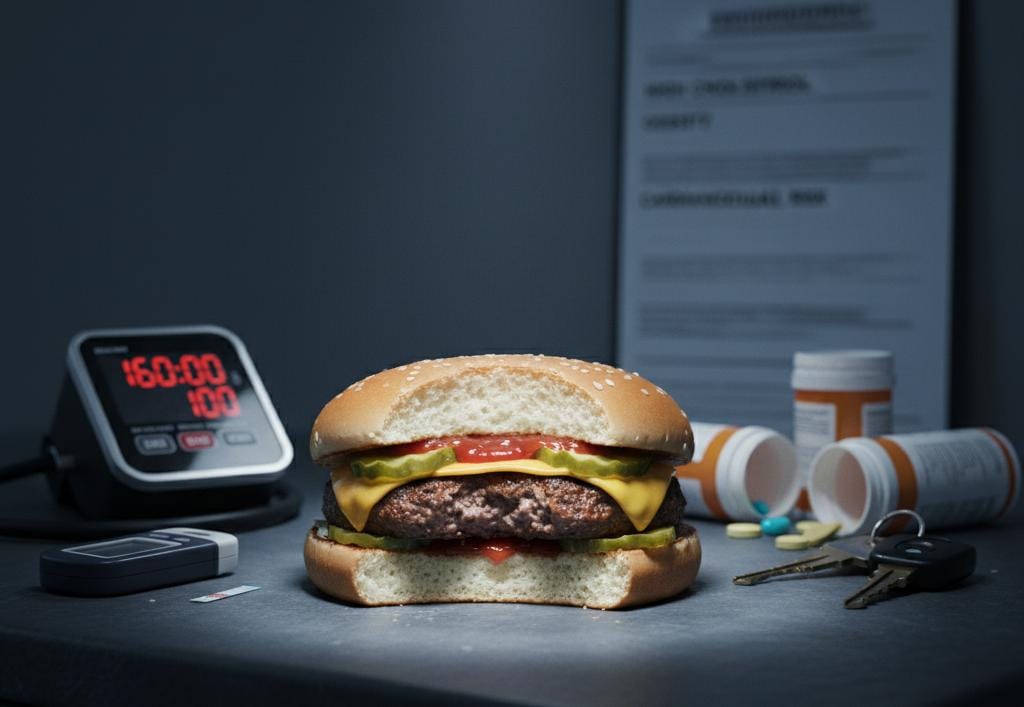
Cheeseburgers are one of the most popular and delicious foods in the world. They are fast, easy to eat, and can taste amazing. But like many good things, having them too often can be bad for your health. While one cheeseburger once in a while is usually fine, making them a regular part of your diet can lead to several serious problems.
Here, we break down the main disadvantages and health risks of eating too many cheeseburgers
1.Too Much Fat, Especially the Bad Kind (Saturated Fat)
The main problem with a typical cheeseburger is its high fat content. This fat comes mostly from the beef patty and, of course, the cheese.
- Saturated Fat Danger: Cheeseburgers are very high in saturated fat. This type of fat is known to raise the level of “bad” cholesterol (LDL) in your blood. When LDL cholesterol is too high, it can start to build up in your arteries (the tubes that carry blood). Over time, this buildup can block the arteries, which is a major risk factor for heart disease and strokes.
2.High in Calories, Leading to Weight Gain
Cheeseburgers are what we call a “calorie-dense” food. This means they pack a lot of energy (calories) into a small size.
- Quick Calorie Overload: A single medium-sized cheeseburger, especially one from a fast-food restaurant with extra sauces and a side of fries, can easily contain 500 to 1000 calories or even more.
- The Weight Problem: When you eat more calories than your body uses in a day, the extra energy is stored as fat. Regularly eating high-calorie foods like cheeseburgers is one of the quickest ways to lead to weight gain and obesity. Obesity increases your risk for many other serious health issues, including Type 2 diabetes.
3.The Sodium Bomb (Too Much Salt)
Most cheeseburgers—from the seasoned patty to the processed cheese, pickles, and ketchup—are loaded with salt, or sodium.
- Blood Pressure Risk: Your body needs some salt, but too much is bad for your blood pressure. High sodium intake makes your body hold onto extra water, which puts stress on your blood vessels and heart. This can lead to high blood pressure (hypertension), which is a key factor in heart attacks and strokes. Many fast-food cheeseburgers can contain almost half of the recommended daily limit for sodium in just one meal.
4.Lack of Good Nutrients (Vitamins and Fiber)
While the beef patty in a cheeseburger does give you some good protein, iron, and B vitamins, the overall meal is often poor in essential nutrients that your body needs daily.
- Low in Fiber: The white bread bun, meat, and cheese have very little to no fiber. Fiber is essential for a healthy digestive system, helping you feel full, and managing blood sugar. A lack of fiber can cause digestion problems like constipation.
- Missing Vitamins: Cheeseburgers often lack the vitamins and antioxidants that come from fresh fruits and vegetables. If cheeseburgers replace healthier meals, your body misses out on these crucial protective elements.
5.Blood Sugar Spikes
The combination of the white bread bun and sugary condiments (like ketchup or special sauce) means a cheeseburger has a lot of easily digestible carbohydrates.
- The Energy Crash: These simple carbs are quickly broken down into sugar in your bloodstream. This causes a rapid spike in blood sugar, followed by a quick drop (an “energy crash“). Over time, these frequent spikes can lead to your body becoming resistant to insulin, which is the path to developing Type 2 diabetes.
6. Food Safety Concerns (If Not Cooked Right)
This is a risk especially with ground meat. When meat is ground into a patty, any harmful bacteria (like E. coli) from the surface can spread throughout the entire burger.
- Risk of Food Poisoning: Unlike a steak, a cheeseburger patty must be cooked all the way through. If the middle of the patty is not fully cooked, it can still contain these harmful bacteria, which can cause severe food poisoning, leading to vomiting, diarrhea, and other serious symptoms.
Conclusion: Enjoy in Moderation
Cheeseburgers are a classic comfort food, and it’s okay to enjoy one occasionally. The problems only arise when they become a frequent or daily meal.
To protect your health, remember this simple rule: Moderation is key. If you love cheeseburgers, try to balance them with a diet rich in vegetables, fruits, and lean protein, and choose to have your burger only as a rare treat, not a regular habit. Your heart, waistline, and overall health will thank you for it.
